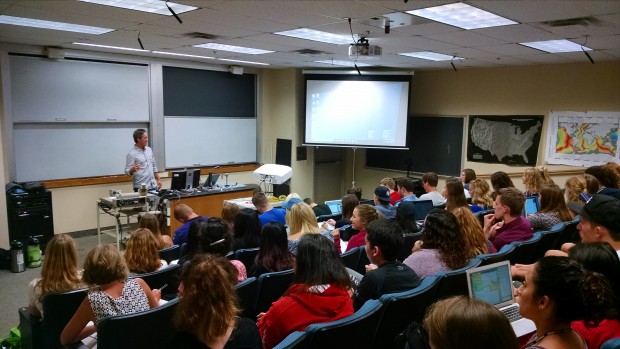
The St. Thomas biology department has partnered with Tiny Footprint Coffee, a local roastery in Minneapolis, to examine ways coffee chaff can be used for sustainability.
The owners of Tiny Footprint Coffee connected with Maria Dahmus, program manager of St. Thomas’ Sustainable Communities Partnership, to investigate alternative uses of chaff, a husk-like byproduct of coffee beans, which the company currently composts.
According to Tiny Footprint Coffee’s website, it takes 4 lbs of CO2 to produce and distribute 1 lb of their coffee. A portion of the proceeds from coffee that is sold goes to a reforestation effort in Ecuador’s Mindo cloud forest, where the trees planted by Tiny Footprint Coffee will remove 54 lbs of CO2 from the atmosphere. Overall, more CO2 is removed than emitted, making Tiny Footprint Coffee the world’s first carbon-negative coffee, according to their website.
This semester, students will be studying the properties of chaff and proposing experiments to learn how it could be used in a more sustainable way, possibly as a natural pesticide, mulch or even an energy source.
“These projects are things that are not necessarily urgent … but they are things that are very important (to the partners) that they don’t have the time or resources to investigate themselves,” Dahmus said.
Dahmus usually develops partnerships with cities, nonprofits and government entities, but Tiny Footprint Coffee is her first experience connecting a business with a St. Thomas classroom.
“Our mission is to link city-identified sustainability projects with existing courses at St. Thomas so that students engage in real-world problem-solving,” Dahmus said, “while at the same time they’re advancing the business’ sustainability goals.”
Dahmus was interested in partnering with Tiny Footprint Coffee because they take a systems-level perspective to sustainability; the information the students find could be “transferable” to others in the roasting industry, according to Dahmus.
“They are very aware of and intentional about improving the sustainability of all parts of their coffee production supply chain,” Dahmus said. “Whatever their class finds out… could be very helpful for other coffee roasters. This is a byproduct of every single coffee roaster.”
Biology professors Leah Domine and Gaston “Chip” Small adopted the Tiny Footprint Coffee project and implemented it in 12 classroom and lab sections of a sustainable biology course.
Domine said students in this course learn about the topic of sustainability through a biological lens and cover a variety of issues including human health, agricultural challenges and the spread of disease. This year students will apply what they learn in class to the partnerships.
Senior Zachary Beckman is looking forward to working on the coffee project in the biology of sustainability course.
“We can use a lot of different biological calculations in order to figure out how we can actually quantify the amount of carbon being placed in the atmosphere,” Beckman said.
Small described the project as more than just a classroom assignment for a grade. He thinks it will provide a unique experience for students to work on a real-world problem without a defined answer in mind.
“It’s good experience essentially working as a contractor, almost. You’re hired to solve this certain problem or write a report on this specific information,” Small said.
Emily Sweeney can be reached at swee4225@stthomas.edu

